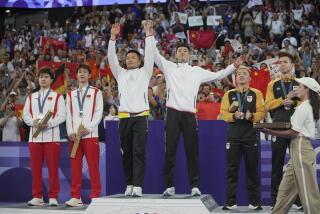China Assails Taiwan Peace Effort
- Share via
BEIJING — After three days of silence, China today slammed Taiwan’s proposal to reduce cross-strait tensions, arguing that the initiative was deceptive and part of a veiled attempt to gain independence.
Beijing was responding to a National Day speech Sunday in which Taiwanese President Chen Shui-bian called for renewed dialogue and direct air links between the longtime rivals. China has viewed Taiwan as a rightful part of its territory since the two separated in a 1949 civil war.
“Chen Shui-bian claimed that he intends to ease tensions and confrontation across the Taiwan Strait, but has obstinately stuck to his separatist stand of ‘one country on each side’ of the strait,” said Zhang Mingqing, spokesman for the mainland’s Taiwan Affairs Office, at a news conference in Beijing.
“If Chen Shui-bian remains bent on sticking to his splittist and Taiwan independence activities, he will never bring peace and prosperity to the Taiwan compatriots, but will only bring great catastrophe.”
Chinese analysts echoed Beijing’s line, arguing that Chen’s latest initiative was deceptive. On the surface it looked constructive and responsible, they said. But it is based on the premise that the two sides confer as distinct sovereign states, something China cannot accept.
“It’s a very foxy strategy,” said Zhu Weidong, assistant director of Taiwan studies at the Chinese Academy of Social Sciences in Beijing. “On the one hand, he’s claiming he wants to be friends. On the other, he indicates he wants to be separate. All in all it’s just an attempt to gain independence without resorting to military force.”
Analysts in Taiwan said the harsh reaction from China was predictable. But some also said Chen should have expected it.
Chen’s aides said several days before his Oct. 10 speech that it would include a major new initiative regarding the mainland.
“But if you look at what he said, there’s nothing dramatic, nothing really new,” said Wu Yu-shan, a political scientist with Academica Sinica, a Taiwanese think tank. “So there’s disappointment.”
Wu said Chen’s proposal was aimed less at Beijing than at Washington, in a bid to persuade U.S. voters and congressmen that he’s reasonable and Beijing is not.
Chao Chien-min, a political scientist with National Chengchi University in Taipei, said another key objective for Chen was to play to the home crowd. Taiwan will hold a legislative election before the end of the year. If his party can win a majority, Chen would be in a better position to pass a controversial proposal aimed at buying up to $18 billion in U.S. weapons. He would also be in a position to initiate a reform of Taiwan’s Constitution.
“The president wants to be remembered as someone who created a true Taiwan identity,” Chao said. “In order to leave a legacy, he needs to get his policy implemented. This election is very important.”
While few of the charges or proposals emanating from either side of the increasingly tense strait are new, analysts said the exchange signals that China’s new leadership team headed by President Hu Jintao will maintain the hard-line stance toward Taiwan set by his predecessor.
Hu recently strengthened his position after ex-President Jiang Zemin agreed to step down as head of a key military commission and hand the position to Hu. Some speculated that this might lead to a softer line toward Taipei or a willingness to explore new directions, given Hu’s less confrontational style relative to his predecessor.
But many of Jiang’s appointees remain in charge of the Taiwan portfolio, suggesting little has changed.
In his comments today, Zhang said Taiwan’s independence is the biggest danger to peace and stability across the Taiwan Strait and in Asia, adding that Chen’s speech was “an attempt to cheat the Taiwan people and international public opinion.”
Taiwan’s president has “continued to deny the fact that Taiwan is a part of China and has wantonly stigmatized and viciously attacked the motherland to fuel the tension across the Strait,” Zhang said.
More to Read
Sign up for Essential California
The most important California stories and recommendations in your inbox every morning.
You may occasionally receive promotional content from the Los Angeles Times.













